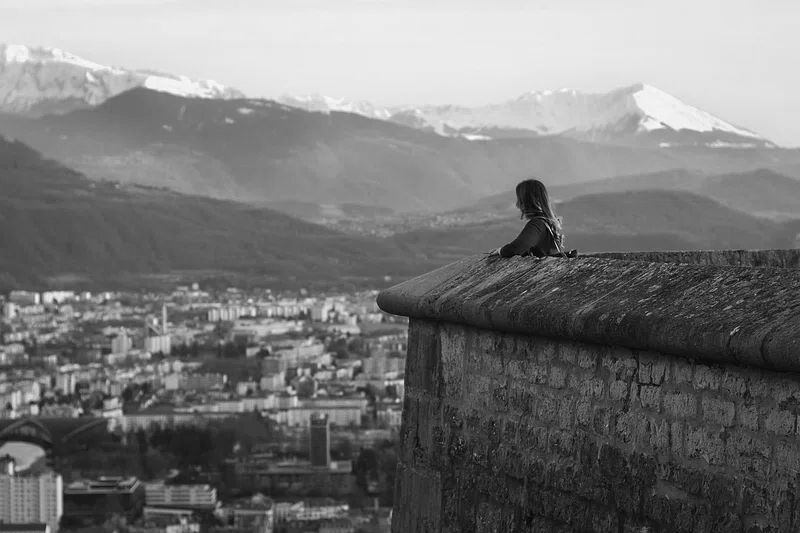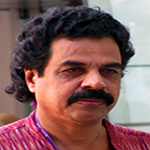Translated from Malayalam by K. M. Ajir Kutty

Image Used for Representation
The mountain ranges surrounding the town turned dark. A car was going fast along the road lined on either side with Palmyra. The shop of Aithu Naik was at the start of the town. He was counting money as usual before closing the shop. As he had finished counting seven hundred and fifty, a white car stopped right in front of his shop. Aithu Naik looked up and saw that it was a woman who was driving the car.
She got out of the car and walked to stand before Aithu Naik.
“Do you know where the body of the swami is?” she asked in a subdued voice.
Aithu Naik was literally shocked. He thought that she had come looking for an expensive silk sari.
“Swami’s body?” He tried remembering. “O, the swami who died in the morning? He may have been buried already.”
“Where?” She moved a little up.
“May be somewhere on the bank of the river.” Aithu Naik said displaying no interest in the matter.
Of his workers, Venkappayya alone was in the shop at that time. It was Venkappayya who was to pull down the shutter once he got out of the shop with the bag of money.
“Not there.” He corrected him. He had known from somebody that it was at Rishikesh that the body of the swami would be cremated. He was not sure whether the body had been taken to the airport on its way to Rishikesh. The airport was three hundred kilometers away. Around noon an ambulance had appeared on the road. There were no other vehicles accompanying the ambulance. It was along with some of his disciples that the swami had arrived in the town. None of them had accompanied the ambulance. Perhaps it was not the body of the swami in the ambulance.
“There is a monastery nearby. If you ask there, you will get all information,” Aithu Naik said.
She did not know where the monastery was.
Aithu Naik gave her the directions to the monastery. She folded her palms before him and walked toward the car.
It was only after the car moved that Aithu Naik and Venkappayya looked at each other and doubted how the woman was related to the swami who had passed away. They both agreed that the woman appeared aristocratic. Umm…let it be whatever it is. Aithu Naik again began counting his money.
She did not lose her way. She stopped the car at the gate of the monastery and blew horn.
The gate lay closed. On either side of the gate, lamps shone brightly.
She got out of the car and walked up to the gate.
A man came out of the monastery and walked with a lighted torch in hand through the plants and trees towards the gate. He had worn an ochre robe with a woolen blanket wrapped around his body.
“Why? What’s the matter?” he asked looking hesitantly at the woman visitor through the barred gate.
She wanted to know whether the corpse of the swami was taken to Rishikesh. “We have no connection with them. They are a different sect.” She returned to the car even as his look of displeasure faded in and out in the darkness.
Before starting the car again, she sat for a while with her hands on the steering wheel in a mood of uncertainty. Meanwhile, her mind hastened to go back once again into the time bygone. Restraining it, she took the car up. She felt as though she was travelling through the labyrinth of an alien city. There was smoke everywhere.
“Come,” getting down onto a long corridor of the hospital at the medical college, Nachanna who was an employee there, said.
She followed Nachanna. He had a bunch of keys in his hand.
“Heard that the corpse would be taken to airport early at daybreak tomorrow. The disciples are staying at a star hotel here,” Nachanna said.
She saw the body as soon as the morgue door was opened. It was lying on a table covered with a white cloth.
Nachanna slowly pulled down the cloth from the face of the body. Gray hair and the broad forehead came into view. The eyebrows had white hairs lining through them. The eyes were closed and the beard was gray. The bosom protruded as though it was a cage of bones.
“Let me sit here for some time,” she said.
“We thought that the disciples would sit here. But none of them turned up again. When I saw them last time, they were all sitting around a fire in the courtyard of the hotel. All of them are from America. There are two women also among them. One of them was playing the guitar,” recounting what he saw, Nachanna got out of the morgue and closed its door from behind.
She sat there on a stool by the side of the table, looking intently at the body.
After some time she touched the right hand of the body. She held the palm close to her heart for some time. Her eyes did not move away from the face even once. She kept looking as though at the touch of her hand at least a shadow of a movement would appear on that face. But nothing happened. The body lay there free from all worries. No shadow did ever enter its eyes shut for ever. It stayed there on the table with a frozen heart. Its brain had long since become empty.
Later, Nachanna woke from his slumber.
He immediately remembered the woman he had left in the mortuary.
Was it a dream? No. A new hundred rupee note that he had in his pocket was proof enough that he had seen the woman.
With the bunch of keys in hand, Nachanna walked in haste towards the mortuary.
When he looked in, he saw the woman leaning against the body with her face on its bosom.
He went toward her in panic.
“Hei,” he called out, stretching out his hand. He did not have the courage to touch her.
It was when he called her a second time a little louder that she opened her eyes; as if she was waking up from a long sleep.
“It is a long time,” Nachanna said restlessly.
She looked at him as though she had not understood anything.
“It is I who will be in trouble,” he said.
She raised her face. It glistened with the thin film of tears. She stood up and wiped her eyes in haste. “Forget it” she said to Nachanna and got out of the mortuary.
Also, read “YOUNG BEASTS AT PLAY” by DAVIDE LONGO published in The Antonym:
Follow The Antonym’s Facebook page and Instagram account for more content and exciting updates.



























0 Comments